METC Trainings
Child Care Trainings
FREE PAID TRAINING FOR CHILD CARE PROVIDERS
The Helen Miller SEIU Member Education & Training Center (METC) is pleased to offer classes that help home child care providers achieve our training and development goals.
These classes are free for CCAP providers like you and are paid for by our Child Care Training Fund, which we won in our Union contract. For many METC classes, you can receive a stipend for your time and participation. Some of the trainings we offer may help you achieve a credential, earn a rate add-on, or meet licensing requirements.
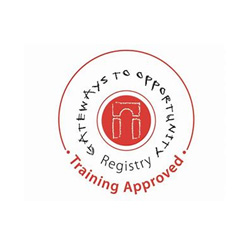
Requirements for Licensed Vs Licensed Exempt Providers
Attention Home-Based Child Care Providers!
On May 26th, DCFS stated that ALL LICENSED providers are required to participate in at least one training that includes the topics: early childhood social emotional learning, infant and early childhood mental health, early childhood trauma, or adverse childhood experiences. Current Licensed providers are required to complete the training by July 1, 2022.
Trainings offered by METC that will help you meet your requirements:
Licensed Providers
- Child Care Anxiety
- Mindfulness Practice: Meditation
- Understanding the Affects of ACEs in Children’s Development
- Social and Emotional Development: How it survives and grows in a new form
Licensed Exempt Non-Family provider, the state of Illinois will be requiring you to complete the following trainings: First Aid and CPR Certification, Mandated Reporter, and Child Development, Health and Safety Basic OR ECE Credential Level 1 – Tier 1. For current License exempt Non-Family providers, your deadline will be September 30, 2022. For NEW License Exempt Non-Family providers (applies to you if you started after July 1st), you must complete these trainings within 90 days of being approved for CCAP payments.
Licensed-Exempt Providers
Trainings offered by METC that will help you meet your requirements:
- Child Development, Health, and Safety Basics OR ECE Credential Level 1 – Tier 1: Modules 1 – 2c
- First Aid and CPR Certification (Adult / Pediatrics)
- *Please check your expiration date – renewal is required every 2 years*
- Mandated Reporter
- *Please check your expiration date – renewal is required every 3 years*
*Please note: all of your required trainings must be reported on your Gateway Registry*
Register for a Class
To register for a specific class log onto Memberlink or call the Member Resource Center (MRC) at 866-933-7348. You’ll need a Member ID to register on Memberlink. You can call the MRC to find out your Member ID number.
How to Use Zoom
Child Care Training Materials
COVID-19
How to Create an Effective COVID-19 Action Plan
Business Empowerment
Child Development, Health, & Safety Basics
ECE Level 1 – Tier 1 – Modules 1 – 2c Online Materials
ECE Level 1 – Tier 2 – Modules 3-6 Online Materials
ECE Level 1 – Tier 3 – Modules 7a – 9 Online Materials
Lead in Water Trainings
Mindfulness Practice: Meditation
Preventable & Unexplained Tragedies
SBS & SIDS
Reading Fun & Building Literacy
Strengthening Business Practices
Strengthen and Grow Child Care Grant
Teaching Black History to Promote Self-Esteem
Trabajando con Niños con Diferentes Estilos de Comportamiento
¿Tendra Autismo Este Niño?/Does This Child Have Autism?
Child Care Class Schedule
Calendar Color Key:
Purple: Bilingual Classes
Yellow: In – Person Classes
Clave de Color del Calendario:
Morado: Clases bilingüe
Amarillo: Clases En Persona
NOTE:
Strengthening Business Practices (English and Spanish) – All sessions required, must be taken consecutively.
ECE Level Tier 1-ECE Level T3 (English and Spanish) – All sessions required – you CAN miss a session, but have 90 days to complete the session you missed.
Reading Fun While Building Literacy (Bilingual) – All sessions required, must be taken consecutively.
Family Child Care Marketing Class (Bilingual) – All sessions required, must be taken consecutively.
Positive Communication (Bilingual) – All sessions required – you CAN miss a session, but have 30 days to complete the session you missed.
January Calendar
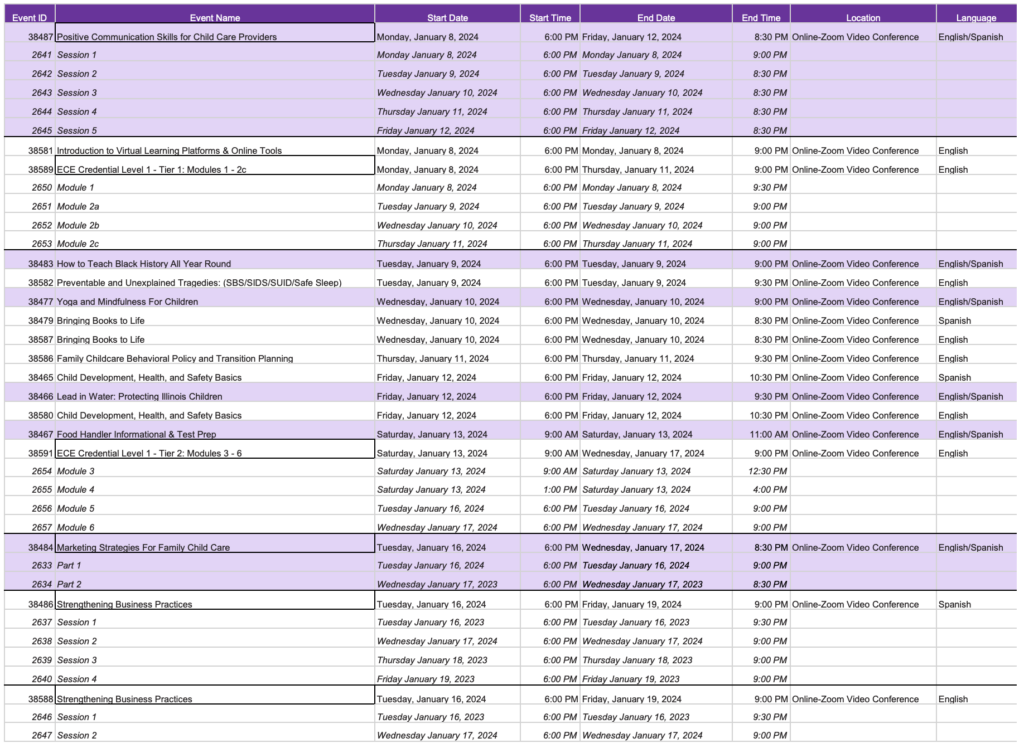
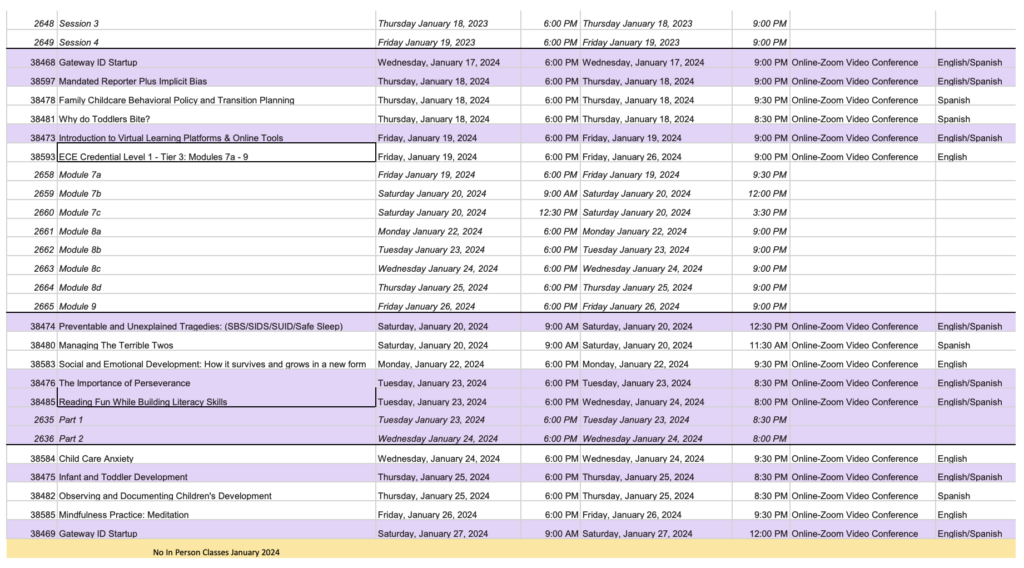
Calendario de Enero
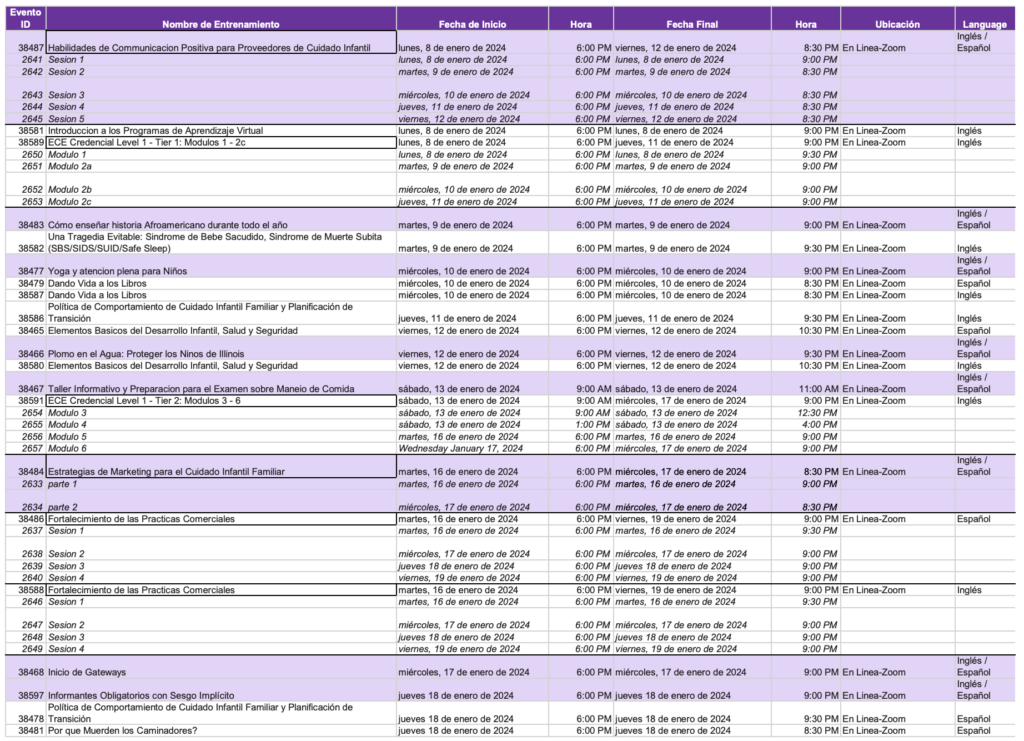
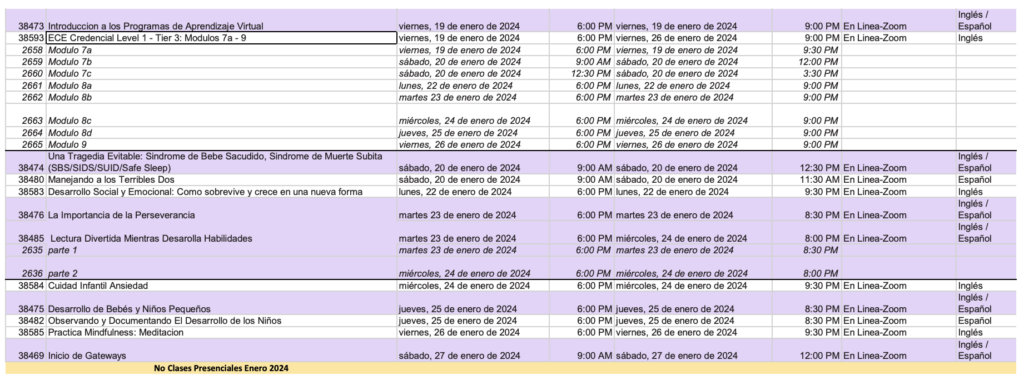
February Calendar
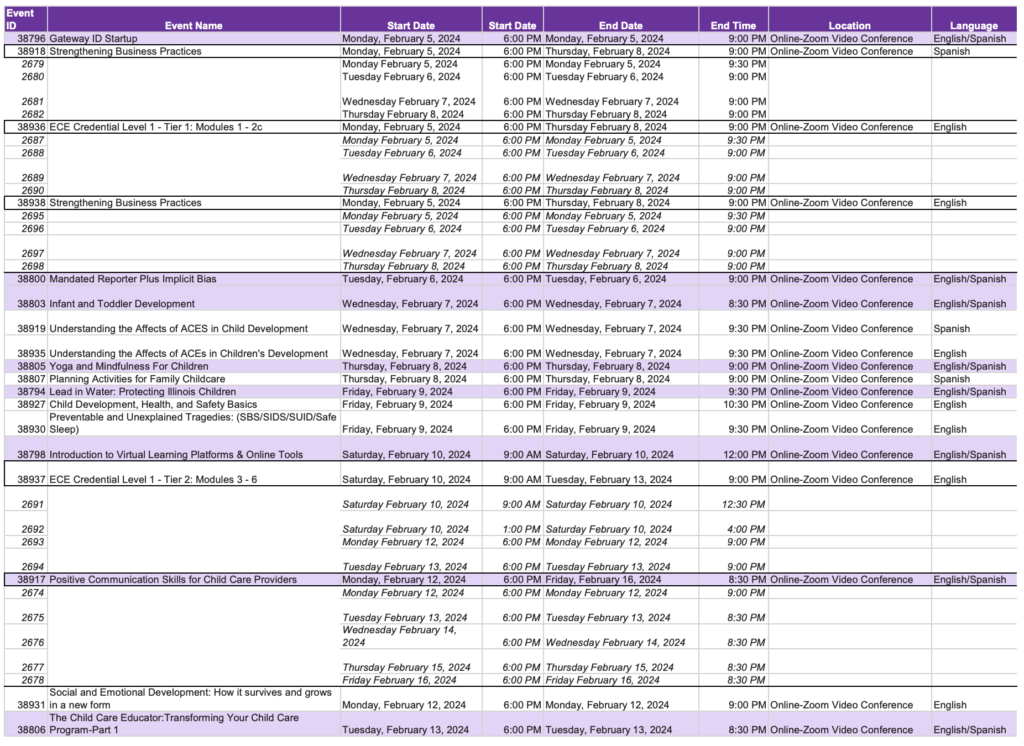
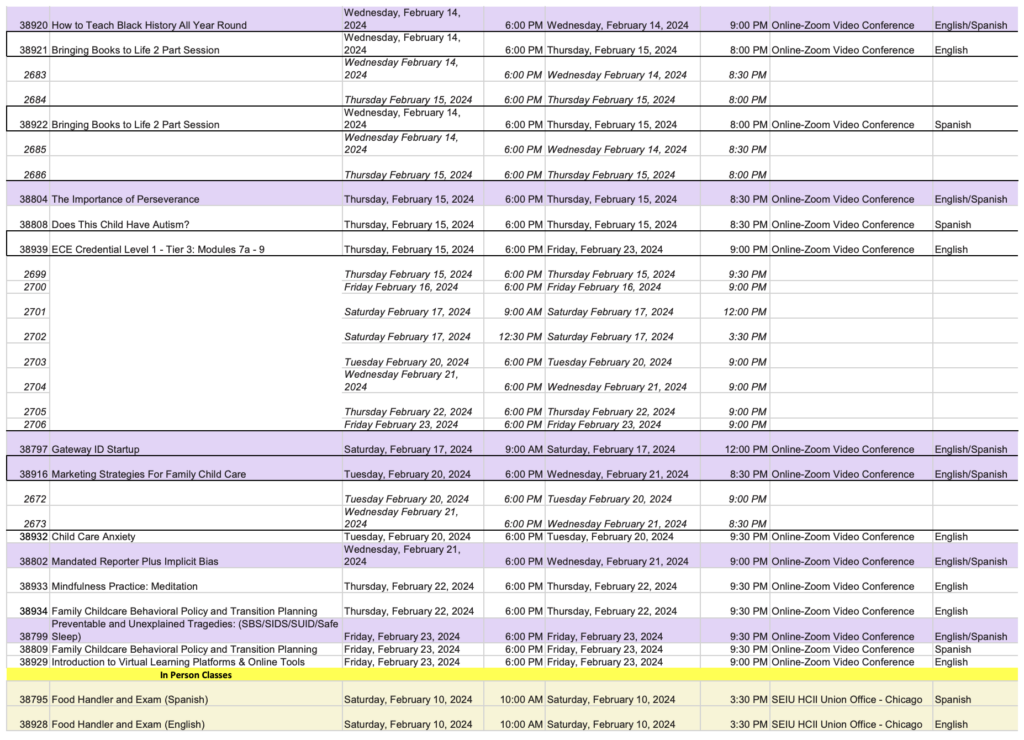

Calendario de Febrero
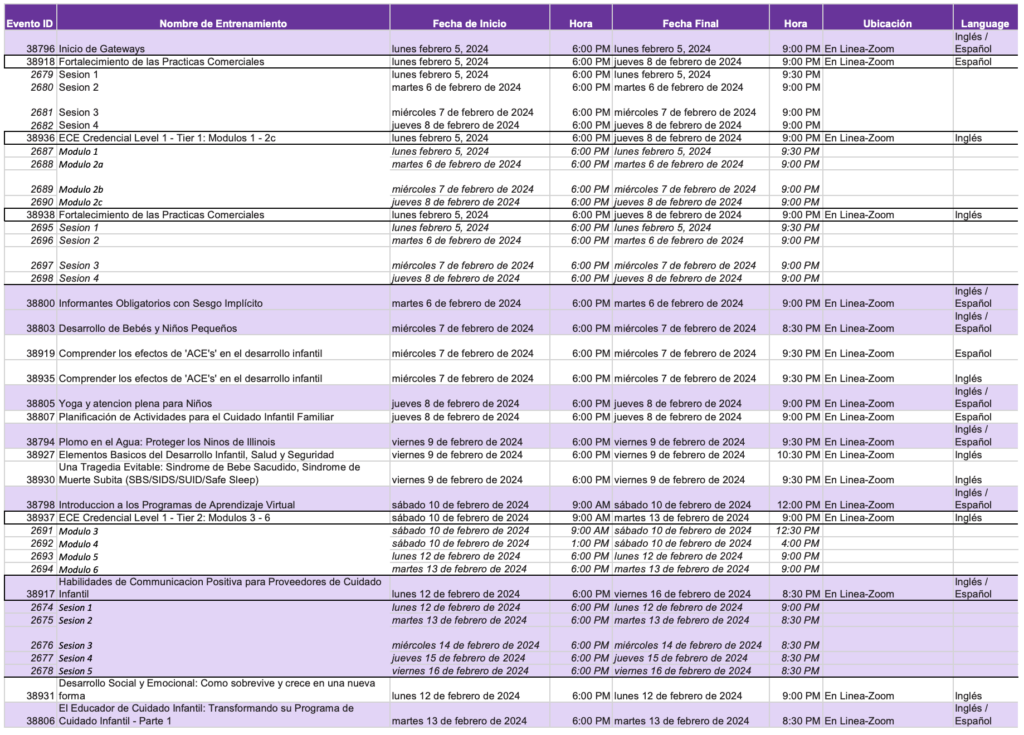
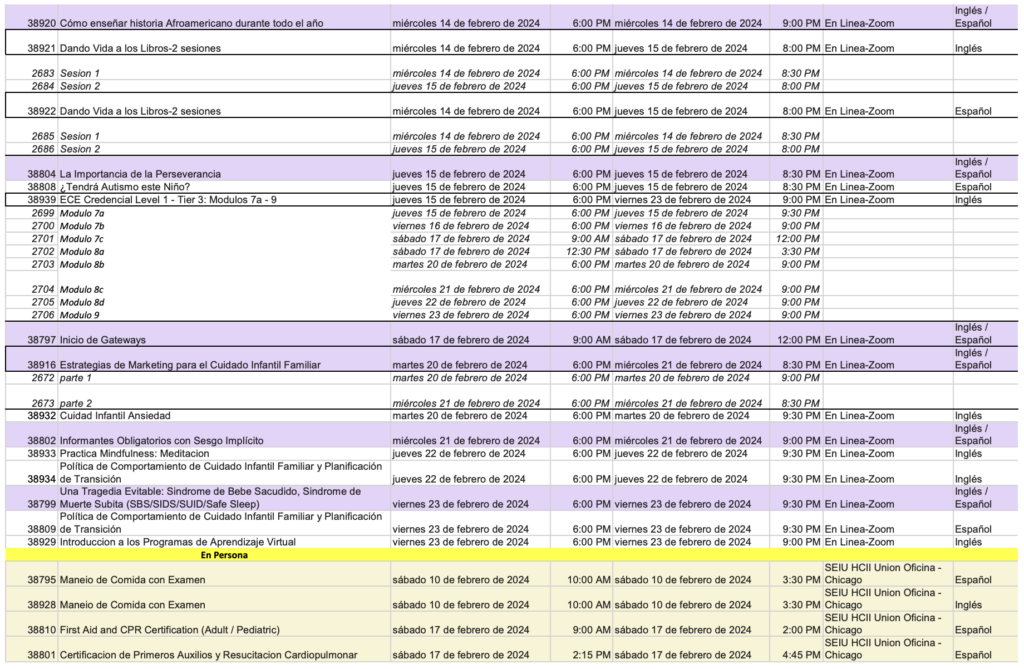
Positive Communication Skills for Child Care Providers
Misunderstandings between people often occur simply because the sender and receiver have different communication styles and expectations. If one person is slow, deliberate, and thorough and the other is fast paced and decisive, their interpersonal relationship may be tense unless they are aware of each other’s communication preferences. Knowledge of communication styles help reduce the likelihood of such frustrations occurring.
COMMUNICATION STYLES:
- DIRECT: Direct communications tell it like it is. They are decisive, take charge people who like to be in control. They possess strong leadership skills, have the ability to get things done, and work single-mindedly toward their goals. Sometimes direct communicators can be perceived as being too strong-willed and overbearing. In their quest to get things done quickly, they may overlook important details. Focusing on feelings is not generally a strength of direct communicators, so they may be viewed in some interactions as lacking empathy.
- SPIRITED: Spirited communicators are enthusiastic, friendly and optimistic. They love to be around other people and enjoy the spotlight. They are good at building alliances and are able to motivate others and generate excitement about issues and projects. They enjoy a fast pace and are decisive decision makers. Spirited communicators are not always the best listeners. They can also exaggerate to make their point, behave impulsively, and gloss over important issues in an effort to rally support for their cause.
- CONSIDERATE: People with considerate communication style value warm, personal relationships with others. They are good listeners, reliable and steady, and supportive of others in a group. Because considerate communicators are easygoing, they may be reluctant to change, preferring to stick with what is comfortable. And because they want to avoid conflict, they may keep their opinions to themselves, give in too easily and not achieve what they want.
- SYSTEMATIC: People with a systematic communication style value accuracy and objectivity. They are analytical in their approach to problem solving and base their decision making on facts and data. They are persistent, orderly, and organized in their approach to their work and their relations with others. Systematic communicators can also be viewed as impersonal and detached, putting accuracy and details ahead of other’s feelings.
Paula Jorde Bloom – Blueprint for Action
Marketing Strategies For Family Child Care
The Marketing training offers ideas and a platform for rich discussion on how to best market your child care business and build your unique brand. We will explore social media platforms, websites, and the benefits of building a parent persona. The workshop will also focus on ways to attract and build parents’ trust.
Mindfulness Practice: Meditation
This training will describe what is mindfulness practice and mindfulness meditation. We will explore the history of mindfulness, the benefits of this practice and how it can be applied in the classroom for predominately children 2 years and up. Staff members and parents are encouraged to practice these techniques with the children in our program. As we are facing many transitions in today’s time, mindfulness practice and meditation is encouraged to help children and adults release stress and worried thoughts. It has many mental and physical health benefits. It is a practice that can be applied in almost every environment of a child’s life. The child can take this practice into adulthood as positive coping mechanisms when they deal with obstacles, conflict, or a crisis.
Child Care Anxiety
This training will inform early childcare providers of the emerging mental health issue children are developing known as childhood anxiety. Early childcare providers will examine what is childhood anxiety and how it is observed throughout different age periods of the child’s lifespan. The training will explore self-teaching practices, changes of the child’s routines and the childcare environment to help support children with anxiety. Early childcare providers will understand how to effectively document the signs of childhood anxiety to collaborate with the child’s parents and community resources.
Understanding the Affects of ACEs in Children’s Development
This training is a call to action on the implications of Adverse Childhood Experience ACEs and how it negatively affects a child’s development. Participants will learn the three main types of traumas and how they can help to combat this National Crises.
The training provides rich discussions and opportunities to share experiences. Open-ended questions will be asked to assess the participant’s knowledge. There are several short videos that offer in-depth information on ACEs. Practitioners will summarize key objectives after watching videos and formulate additional ways they can share information with others to bring awareness to this disease.
Social and Emotional Development: How it survives and grows in a new form
This training focuses on supporting social and emotional develop during a pandemic of the children, their families, and the provider. Providers are encouraged to learn new skills. Children are indeed missing out on opportunities to develop social and emotional skills due to social distancing from peers, the opportunity exists to develop new capacities. Resources and tips are used during this training to help providers create stronger bonds and connections with their children and families. Providers will learn how important it is to also practice self-care that includes self-compassion.
Strengthen and Grow Grant Training (paid stipend)
SEIU/METC is excited to offer the Strengthen and Grow Grant Preparation Training that will provide you with a detailed overview of how to apply for the Strengthen and Grow Child Care Grant. This training will allow you to ask questions and get answers in real-time. We will cover the following:
- Eligibility Requirements for Strengthen and Grow Grant
- How to apply and gain access to the Gateways Director Portal
- Searching for an existing or getting a new DUNS Number
- Completing a W9 Form
- Calculating your percentage of CCAP, private pay, or other payment sources
- Completing, downloading, and e-signing the Attestation Form
- Completing the Budget Worksheet
- Going over the Application
- Overall review of best business practices for funding preparation
Food Handler Training Informational & Test Prep (non-paid)
This bi-lingual (English/Spanish) childcare training is an informational and test prep session for the Servsafe Food Handler training. Successful completion of the online Servsafe training will satisfy the Illinois Department of Public Health/IDHS/DCFS requirement. This 1.5-hour informational session will provide an overview of the online registration, class content and evaluation process for obtaining a food handler certificate. After the informational session, providers will be emailed a link to the course content and assessment from Servsafe to earn certification. This opportunity is provided at no cost to you because childcare providers in our union won funding for provider trainings in our contract with the state.
CDA Cohort & informational
The Child Development Associate (CDA) Credential™ is the most widely recognized credential in early childhood education (ECE) and is a key steppingstone on the path of career advancement in ECE. Once attained, providers can apply for the Great Start wage supplement through Gateways and use the credential to apply for a group family childcare license through DCFS.
The CDA Informational is a short, 2.5 hour (with break) course designed to provide an overview of the process, eligibility, and requirements. This is an informational only and is not eligible for a stipend or Gateways credit hours.
Business Practices for Early Childhood Education Settings (paid stipend)
This short, 2.5-hour (with break) course, is designed to provide training on basic business practices for newer childcare providers. The course will also include an overview of business planning and marketing strategies specific to the childcare setting. (Note: At some point, METC plans to offer a more extensive series of classes for experienced licensed providers.)
ECE Credential (paid stipend)
The ECE Credential Level 1 Training online is designed to introduce individuals to general child development, health and safety, school-age care, observation, environments for children, and the importance of relationships with children and their families. Participants who complete the entire training are qualified for an ECE Credential Level 1, which is the first step on the Gateways to Opportunity Career Lattice. This credential is for individuals interested in entering the field of early care and education.
The ECE Credential Level 1 Tier One consists of 4 modules, each of them is three hours in length. When we enroll you, you will be signed up for all four modules:
Module 1: Child Development Overview
Module 2A: Health Issues
Module 2b: Nutrition Issues
Module 2c: Safety Issues
If you continue on, the ECE Credential consists of 16 total modules. Completing the entire series will earn you 48 contract hours of training and qualify you for the ECE Credential Level 1. The ECE Credential Level 1 credential is awarded to you automatically upon completion of all 16 modules. No application is necessary and there is no cost for the credential.
Lead in the Water (paid stipend)
The Department of Children and Family Services (DCFS) adopted final rules for licensed child care home to address lead in drinking water. Providers must collect samples from their sources of drinking water and send samples to an approve lab. This training helps providers navigate the requirements of these rules and what resources are available to them to satisfy the requirements.
Child Development Health and Safety Basics – CDHS Basics (paid stipend)
This training will provide participants an overview of child development, health, and safety issues for children birth through early school age. Emphasis will be on understanding patterns of development, developmental domains, and the role of nutrition in development. In addition, health and safety issues will address supporting the growth of healthy children – from the basics such as hand washing to more in-depth practices surrounding healthy procedures and disease prevention. Participants will learn more about emergency planning/preparedness and first aid as well as identify tips for maintaining safe indoor/outdoor environments.
Preventable and Unexplained Tragedies (paid stipend)
This training will provide participants with some practical rules to prevent the heartache of sleeping tragedies such as SIDS, SUID (sudden unexplained Infant death). The class will go over best practices. It is a required class for licensed providers to attend.
Gateway ID Startup (paid stipend)
This training is designed to help newer providers navigate the Gateways to Opportunities training system. It will provide instruction for Providers to obtain a Gateway’s ID number and will help them understand requirements and opportunities for training through the system.
How to Create an Effective COVID-19 Action Plan Module 1 (content last updated August 2020)
Is a 3.5 hour (including break) training that will provide participants with an overview of COVID-19 as they understand the importance of developing a health and safety action plan for the children, families and staff they work with. Emphasis will also be placed on understanding the guidelines of the Department of Children and Family Services (DCFS). In addition, health and safety issues will be addressed to support the growth of healthy children, from basics like hand washing to more detailed practices on healthy procedures and disease prevention.
CPR/FA/AED Informational & Prep Session (non-paid)
In this 1.5-hour informational session, participants will receive instructions on taking the American Red Cross Blended CPR/FA/AED certification training. We will discuss the options that meet IDCFS and IDHS training requirements and how it is being offered. Participants will learn the process for taking the class and have an opportunity to ask questions.
Introduction to Virtual Learning Platforms & Online Tools (paid stipend)
The purpose of this 2.5-hour (including break) course is to familiarize participants with Zoom as an online learning platform. We will discuss the differences between Zoom and other web-based platform such as WebEx, GoToMeeting, Microsoft Teams. We will present different Zoom features that allow for a more interactive online learning process. At the end of this course, participants would have learned features such as Polls, sharing files and live URL links via the Chat Box; renaming themselves and others, use of interactive features like Breakout Rooms, and screen sharing. This class also teaches how to manage the control bar as a participant and as a host, how to designate co-hosts when needed, and how to use audio/video features to enhance the learning experience.
